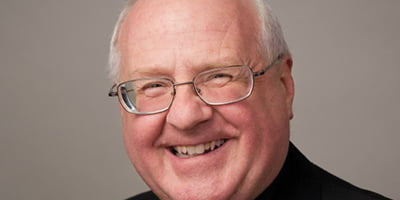
Father Mark Goldasich is the pastor of Sacred Heart parish in Tonganoxie. he has been editor of the Leaven since 1989.
by Father Mark Goldasich
It all started with a stoplight, a Mercedes, and a homeless man. Those three elements, along with the idealism of a 14-year-old Atlanta girl, transformed one family forever.
It happened, as things like this often do, in a most unexpected way. The 14-year-old, named Hannah Salwen, was in a car one day with her dad Kevin. They found themselves waiting for a stoplight to change. In front of them was a shiny Mercedes; a homeless man with a sign asking for donations for food was standing on the corner. In a sudden flash of awareness, the injustice of the scene struck Hannah.
“You know, Dad,” Hannah said, “if that man had a less nice car, that man there could have a meal.”
That simple statement would end up taking the Salwen family — Hannah, her parents Kevin and Joan, and her brother Joseph — on a journey they never imagined taking. Over
the course of the next two years, this well-to-do family would take a hard look at itself and its lifestyle. Eventually, the Salwens would end up selling their 6500-sq.-ft. home for one half that size. Even more remarkable, the family would donate half of the selling price — some $800,000 — to help 12 desperately poor villages in Ghana, Africa. The Salwens have captured their story in “The Power of Half: One Family’s Decision to Stop Taking and Start Giving Back” (Houghton Mifflin Harcourt, 2010; $24).
Hannah wrote in her journal that seeing the Mercedes and the homeless man made her sad and then angry, mainly at herself. She realized how much she had, while others had so little. She then challenged her family to make a difference in the world, “even if it’s a small difference.”
What most fascinated me is the amount — half — that this family chose to give away. When most people think of donating, a “tithe,” or ten percent, comes to mind. And if people actually did that, it would be remarkably generous, considering that most people contribute only somewhere in the neighborhood of two percent of their income to charity.
When asked why fifty percent, Kevin noted that so many times people have a good intention to do “more,” but for him that’s “too vague to be useful.” Fifty percent, on the other hand, is very measurable. Everyone knows what “half” is.
After determining the amount to be donated, the Salwens decided to help out some villages in Ghana — places so insignificant, they didn’t even appear on a map. Most had no electricity or running water. The family chose these villages because there are absolutely no safety nets there (like food stamps, for example), and money goes a lot further in Africa than in the States, allowing more good to be accomplished.
As we anticipate marking World Mission Sunday next weekend, perhaps we can be inspired by the example of the Salwens. Realistically, very few people can do what they did financially. However, that doesn’t let us off the hook. There are plenty of other “halves” that we can pursue.
For example, could we watch half as much TV and donate the “extra time” to learning as a family about a land or culture that is foreign to us? Can we hit the coffee shop or convenience store half as often and put that money instead into the World Mission Sunday envelope? Can we plow through our closets and donate half our shirts or pairs of shoes to a clothing drive? Can we eat half as much once a week and donate the saved amount to charities that alleviate world hunger? The key elements are to do something practical and measurable, consistently, and as a family.
As the Salwens set out to help the world, they themselves were transformed. In the mansion they used to live in, everyone scattered to his or her own separate space and rarely saw or even spoke to one another. In their smaller house, the Salwens sat around the table together much more often, actually enjoyed one another’s company, and were able to discuss issues of deep human importance.
So, ponder the “power of half.” See if it’s right for you. And if you’re doubtful that your small contribution of money, clothing or time will really matter, be inspired by a favorite quote of the Salwen family. It comes Anita Roddick, the founder of the Body Shop: “If you think you’re too small to make a difference, you’ve never been in bed with a mosquito.”
On World Mission Sunday next weekend, maybe it’s time to finally go halfway.

